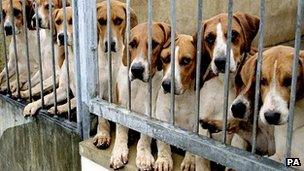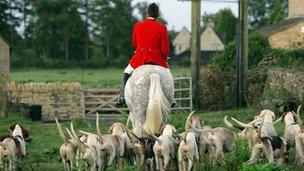Hark forward to the hunting vote?
- Published
- comments

The Coalition Agreement pledged a motion on a free vote on the repeal of the Hunting Act
MPs have been promised a vote on whether to scrap the hunting ban before the end of this Parliament.
Countryfile viewers heard it from the lips of the Prime Minister, external himself on Sunday evening.
In a sense - as readers of this blog are probably already hastening to point out - this was old news. Eighteen months old in fact.
The Coalition Agreement, external of May 2010 pledged "a motion on a free vote enabling the House of Commons to express its view on the repeal of the Hunting Act".
There was no indication of a time-scale.
But the Coalition Agreement itself, of course, only applies to a brief window of time - namely the current Parliament, due to end no later than April 2015.
Timescale speculation
However, it is fair to say the Prime Minister and the rest of the government have been particularly vague about the timing of the hunting vote ever since.
When questioned at this year's Conservative Conference Mr Cameron would only say it would "be brought forward in due course".
None of this did anything to dampen speculation that the hunting vote might quietly slip off the radar and disappear altogether.
The government has repeatedly insisted that it needs to concentrate on sorting out the economy before bothering with things like riding to hounds.
The Countryside Alliance - despite spearheading the campaign to restore hunting - has enthusiastically agreed.
And taken at face value it's a statement which nobody could really take issue with.
Economic priorities?
But is it really that simple?
For one thing, consider how much parliamentary time would really be needed for a simple vote - yes or no - on repealing the hunting ban.
And the fact that MPs find time to debate issues a long way down the pecking order from the economic crisis every week.
It's also become quite clear that many of the keenest pro-hunters simply don't want a vote any time soon. More specifically, not before the end of this Parliament.

Pro-hunters are worried they may not win a vote on scrapping the hunting ban
As one pro-hunting Tory MP told me months ago, they've done the parliamentary arithmetic and worked out they're not likely to win.
Just a few weeks ago the Master of the Devon & Somerset Staghounds, external said publicly that "a vote would be bound to be wrong for us" under the coalition.
And it's not just the lack of a Tory majority which poses problem.
A small but not insignificant minority of Conservative MPs - mainly from the 2010 intake - would also vote against repealing the ban.
Mr Cameron's latest comments, though, appear to scotch the theory that the pro-hunting lobby itself had quietly contrived to stymie the vote.
But will a pro-hunting Prime Minister - who clearly committed himself to a vote to please the country sports lobby - really lead his troops to almost certain defeat?
He could be taking the disinterested view that, as it was promised in both the Conservative manifesto and the Coalition Agreement, a vote has to be delivered in this Parliament on principle regardless of the likely outcome.
On the other hand - from a purely tactical point of view - there could be political advantage in a vote which is held and lost.
Mr Cameron would have honoured his word and discharged his duty to the hunting fraternity.
But he wouldn't find himself heading into the next election - fighting hard to reach out beyond the Conservative core vote - as the Prime Minister responsible for bringing back hunting.
Devolved nations
A pro-hunting Tory who'd previously lamented the way the votes were likely to stack up has also suggested another potential outcome.
And one which would be much more palatable for all those who thrill to the sound of horn and hounds.
It's based on another piece of news both old and new.
The Coalition Agreement promised a commission to look into the West Lothian Question: in other words the right of MPs from the devolved nations to vote on purely English matters.

Hunting is a devolved issue north of the border with Holyrood outlawing the practice two years before Westminster
This is currently a one-way street which allows Scottish or Welsh MPs to vote on issues in England, while English MPs and the Westminster parliament have no say over the equivalent policy areas in Scotland or Wales.
It tends to exercise people with regard to major issues like health and education.
But if the government does decide to deprive Scottish MPs of their voting rights on certain issues, hunting looks as if it should be a strong contender.
Hunting is an entirely devolved issue north of the border; indeed Holyrood outlawed hunting two years before Westminster did.
The not so snappily-named Commission on the Consequences of Devolution, external is now beginning its work and expects to report back in May 2013.
Depending on what it recommends - and what the government decides to do about it - Scottish MPs may find themselves in a rather looser relationship with Westminster, even if their countrymen choose not to opt for independence in 2014.
And were Scottish MPs to be barred from walking through the division lobbies, the parliamentary arithmetic would start looking a great deal rosier for the hunting lobby.